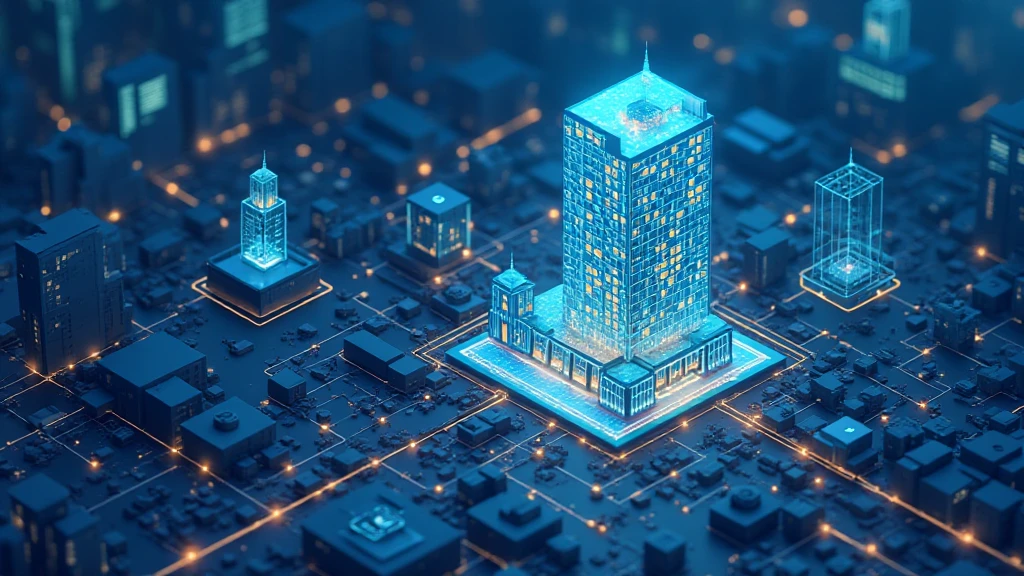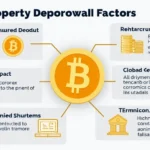Top 10 Crypto Real Estate Use Cases: Revolutionizing Property Transactions
With the real estate market continuously evolving, and the integration of technology changing how transactions are made, it is no surprise that the convergence of blockchain technology and real estate has gained considerable attention. An estimated $4.1 billion has been lost to fraudulent activities in real estate transactions in recent years. Enter cryptocurrencies, which are altering the landscape with promise and security. In the following sections, we will delve into the top 10 crypto real estate use cases that are reshaping this vital sector.
1. Tokenization of Real Estate Assets
Tokenization is a transformative approach where real estate assets are divided into digital tokens on a blockchain. This method allows fractional ownership, giving investors access to high-value properties without needing significant capital.
- Accessibility for smaller investors
- Increased liquidity in the real estate market
- Enhanced transaction efficiency
For instance, platforms like RealT offer tokenization, enabling users to purchase fractions of real estate using cryptocurrencies. This approach provides a more extensive market, especially in developing countries like Vietnam, where growth in cryptocurrency adoption increased by over 40% in 2023.

2. Smart Contracts for Property Transactions
Smart contracts automate real estate transactions, eliminating the need for intermediaries. This is akin to a bank vault, where the smart contract specifies conditions, ensuring that all parties fulfill their obligations before funds are released.
- Reduction of fraud risks
- Lower transaction costs
- Faster closing times
For example, in countries with stringent real estate laws, smart contracts can streamline the process, reducing bureaucracy. This is particularly relevant in regions such as Vietnam, where legal complexities often delay transactions.
3. Enhanced Security and Privacy
Blockchain technology offers unparalleled security for sensitive information in real estate transactions. By utilizing blockchain, sensitive data is encrypted and immutable, minimizing the risks of data breaches and fraud.
- Decentralized data storage
- Transparency in transactions
- Protection against hacking
According to Chainalysis, fraud detection systems in blockchain can reduce security threats by over 70%. This is critical in real estate, where the stakes are high and trust is paramount.
4. Global Reach and Accessibility
Cryptocurrencies enable international transactions without the need for currency conversion or delays associated with traditional banks. This enhances accessibility for global investors who wish to enter local markets.
- Circumvention of exchange rates
- Direct transactions from anywhere
- Opportunities in emerging markets
In Vietnam, the rising popularity of digital currencies enables more property investments from foreign buyers, reinforcing the nation’s standing in the global market.
5. Crowdfunding Real Estate Projects
Decentralized finance (DeFi) solutions enable crowdfunding of real estate projects through token sales. Investors can pool resources to fund development projects, diversifying risks and rewards.
- Access to new development projects
- Community involvement in investments
- Democratization of real estate opportunities
As a result, platforms such as Fundrise allow people to invest in property developments worldwide, creating opportunities for investments that were previously limited to wealthy investors.
6. Decentralized Title Management
Blockchain provides a single source of truth for property titles, assuring buyers of ownership legitimacy. This reduces disputes over ownership and simplifies the title transfer process.
- Permanent records of ownership
- Faster dispute resolution
- Lower transaction fees
This decentralized approach can significantly benefit Vietnamese property owners by mitigating title fraud, which has historically plagued the real estate market.
7. Virtual Tours and Augmented Reality
The integration of virtual reality (VR) in conjunction with blockchain facilitates remote property viewings, enhancing the buyer experience without the necessity of physical presence.
- Increased engagement for buyers
- Broader marketing reach
- Time-efficient processes for property viewing
In Vietnam, where urbanization is rapid, leveraging VR technology can help real estate agencies attract international clients effortlessly while showcasing properties more effectively.
8. Property Management Automation
Blockchain streamlines various property management tasks, from tenant screening to payment collection, thus enhancing efficiency and transparency for landlords.
- Real-time data access
- Automation of rent collection
- Improved tenant-landlord relationships
As property management in Vietnamese cities grows increasingly complex, leveraging blockchain’s capabilities can enhance overall satisfaction for both landlords and tenants.
9. Compliance and Regulatory Benefits
Blockchain technology helps companies ensure compliance with local laws and regulations through transparent record-keeping and reporting. This is especially critical in regions with strict regulatory environments.
- Greater transparency in transactions
- Efficient reporting structures
- Enhanced trust with stakeholders
The Vietnamese government is increasingly focusing on regulatory advancements, where blockchain can play a vital role in ensuring real estate compliance.
10. Opportunities for Sustainable Development
Blockchain technology can support sustainable real estate initiatives, enabling transparency in energy usage and carbon offsetting, which are becoming essential to buyers.
- Tracking of energy consumption
- Incentives for sustainable practices
- Contribution to green technology
With Vietnam’s commitment to sustainability, this application of blockchain can drive innovation in eco-friendly property developments.
Conclusion
As we navigate through the intricacies of real estate transactions, embracing the top 10 crypto real estate use cases serves not only to enhance efficiency and security but also democratizes access to property investment. The fusion of blockchain technology with real estate opens new avenues for investors, developers, and agencies alike. As the demand for transparency and efficiency continues to rise, leveraging cryptocurrencies in real estate transactions will persist in redefining industry norms.
Understanding how to audit smart contracts and comply with the latest regulations can further leverage the success of these use cases. Notably, this shift reflects Vietnam’s increasing engagement in the crypto space, marking it as a key player in the global market. Embrace the transformation that blockchain offers, and tap into the future of real estate today.
**Author: Phạm Minh Tuấn, a blockchain tech expert with a focus on real estate applications. He has published over 15 papers in blockchain technology and has led audits for several pioneering projects in the sector.**




